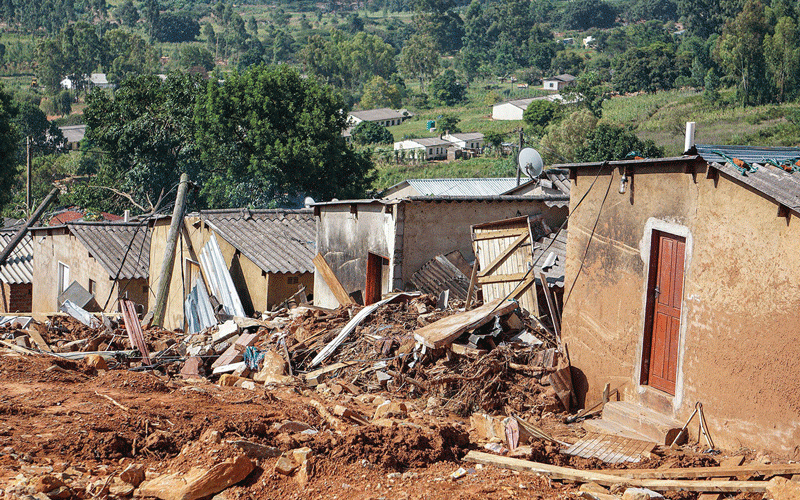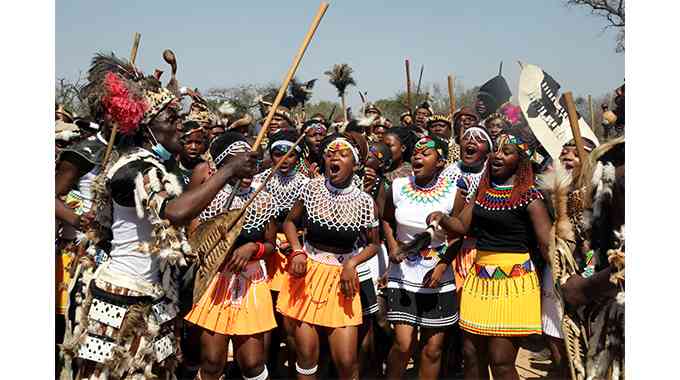
A FAMILY crisis erupts after a woman attends a climate meeting called by the Chimanimani local authority, in a play performed in rural eastern Zimbabwe.
The family eventually discuss climate issues affecting the area, including Cyclone Idai which had devastated Chimanimani district, roughly 500km east of the capital Harare, in 2019.
The play was a piece of “legislative theatre”— the first of its kind in Zimbabwe — led by local young people who wrote and performed in it.
The production interrogated gender-based violence and the exclusion of women and young people from decision-making on climate policies.
In legislative theatre, community members write and perform a short play based on important issues.
The play ends in a crisis and policymakers are invited to do more than simply watch the drama unfold.
Dubbed “spect-actors”, they may be invited onto the stage to take the place of a character, and so better understand their viewpoint.
The Chimanimani community and policymakers had a brainstorming session afterwards to discuss potential solutions to the crisis depicted.
- Matiza’s widow in estate wrangle
- SA insurer targets Zim after US$2.4 million payouts
- Addressing climate change the green building way
- Hit hard by storms and forest loss, Zimbabweans building stronger homes
Keep Reading
The performance led to a pledge from the local government to update climate plans, taking into account the thoughts of villagers who had watched the play, and to actively engage women and young people in their implementation.
At the same time, policymakers felt they had a golden opportunity to inform community members about existing plans and measures to reduce the risk and impact of future climate disasters.
It also triggered trainings to create disaster-management committees across the district with the aim of increasing preparedness for future extreme weather.
A trail of destruction
When Cyclone Idai swept through Malawi, Mozambique and Zimbabwe, it pummelled the eastern parts of Zimbabwe and did serious damage to Chimanimani district in Manicaland province.
Neither communities nor the government were well prepared.
Landslides and flash floods claimed about 300 lives in the district and at least half of its 135 000 population were heavily impacted, a 2021 study found.
Beyond Manicaland, the five days of heavy rains hampered rescue efforts in the provinces of Masvingo, Midlands and Mashonaland East.
Approximately 270 000 people were impacted across Zimbabwe, the Red Cross reported.
Schools were closed temporarily and water and sanitation infrastructure were badly damaged, as was farmland.
The cyclone exposed weaknesses in Chimanimani’s disaster-risk management, detailed in the 2021 study.
For example, settlements had been planned and built on flood-prone land where three rivers meet.
Although Chimanimani did have a disaster-risk reduction plan, a lack of human and financial resources meant practice drills had not been carried out and it could not be implemented effectively.
A way into dialogue
Partly as a response to the damage wrought by Idai, the Green Governance Trust, a non-governmental organisation (NGO), led the legislative theatre project in Chimanimani.
The idea was to bring young people, elders and Chimanimani rural district council together.
The performance would ask what can be done to manage the risks of the next climate disaster?
How can young people, women and the whole community be central to that task?
Frank Mpahlo, the trust’s executive director, tells Dialogue Earth that they had discovered a lack of youth engagement in shaping decision-making around disaster response.
“How could we strengthen systems of governance, systems of transparency, accountability, and also participation itself and inclusion for the young people?” Mphalo says.
“Without the inclusion of all the communities concerned, then there is no democracy in that process.”
One of the actors in the play was 25-year-old Tinovimbanashe Tendeukai, who was forced to evacuate Ngangu village after the cyclone struck.
Today, Tino, as the community affectionately knows her, describes herself as a “victor”, leading climate projects in the village.
Tino played the part of a council representative.
When she stepped forward in character to speak to community members, they murmured their disdain.
For many in this rural district, local officials mean only tax collection.
She pressed on undeterred.
Her role in the play was not to gather levies, but to deliver a message about a far greater threat — climate change.
Tino says the production changed people’s perspective towards the local authority, including its policies and by-laws.
The community, she says, had no idea that the council had a climate change and watershed management policy gathering dust in its offices.
The play helped explain and spread information about the policy, she adds.
Spreading climate knowledge
According to Mphalo, after the play the council started a training campaign for villagers to form disaster-risk management committees, something lacking in Chimanimani district.
The training emphasised the climate change policy and the importance of communities adopting it.
Aleck Mwadzura, a youth leader from ward 22 in the district, says the play not only aided understanding of policy issues but also the challenges that affect the communities.
“It helped us understand what we can do when we are faced with the effects of climate change, including mitigation programmes like growing trees and engaging in gully reclamation activities,” Mwadzura says.
“The most important thing was how many villagers were attracted to the drama, but went home with knowledge on climate change and its effects.”
Ronald Taruvinga, project co-ordinator at the Green Governance Trust, says the play was confined to two wards — 21 and 22 — and there is a need to take it to more of the district’s 23 wards.
“The production was … four months only, including production and staging in the two wards,” Taruvinga says.
“With such an initiative, there is a need to engage more people while covering a larger area.”
Headman Farai Mukondami of Mukondami village in ward 21, which was badly hit by Cyclone Idai, says the production changed perspectives on climate change.
“After the theatre, the understanding of climate change and its effect has become more open to the villagers who have also participated in various activities targeted at controlling disasters,” Mukondami tells Dialogue Earth.
How effective is legislative theatre?
Katy Rubin is a legislative theatre practitioner based in the United Kingdom and co-ordinator of the People Act, which promotes legislative theatre around the world.
She held online meetings to support the project implementers in Zimbabwe.
According to Rubin, Green Governance Trust was well-placed to design and carry out the project as they had already been engaging young people on other climate-related programmes.
This made it easier to communicate to the actors their roles as writers and performers.
The trust also had a strong existing relationship with the council, making the initiative easier to implement, she adds.
“The only challenges were around helping all the stakeholders understand the legislative theatre process and their roles, as this participatory democracy process had not before been used in Chimanimani,” she says.
Legislative theatre in Zimbabwe still has a way to go before it has a major influence on policy making, says Regis Mafuratidze, policy and advocacy manager for the Community Technology Development Trust, a Harare-based NGO.
“Theatre has not spread to a wider audience like in the rural areas where the majority of people live,” says Mafuratidze.
His sentiments are echoed by Daniel Maposa, executive director at Savanna Trust, an arts for social change organisation.
Maposa says at the moment there is limited understanding among Zimbabweans of what legislative theatre is, but it is hoped this will change as more successful productions are staged.
According to Mafuratidze, participatory processes like legislative theatre can be an effective substitute for workshops in Africa.
He says the workshops held in hotels are top-down initiatives without the participation and inclusion of a country’s diverse groups.
He tells Dialogue Earth that there is a need for the public in general to be taught what legislative theatre is and what it seeks to achieve.
“It is not only performance, but an outcome-based process.”
Legislative theatre is spreading globally, existing as part of the growing participatory democracy ecosystem, alongside tools like participatory budgeting and citizens’ assemblies.
Elsewhere in Africa, Street Project Foundation, an organisation in Nigeria, has implemented its first such process, also involving young people on climate issues. — Dialogue Earth










